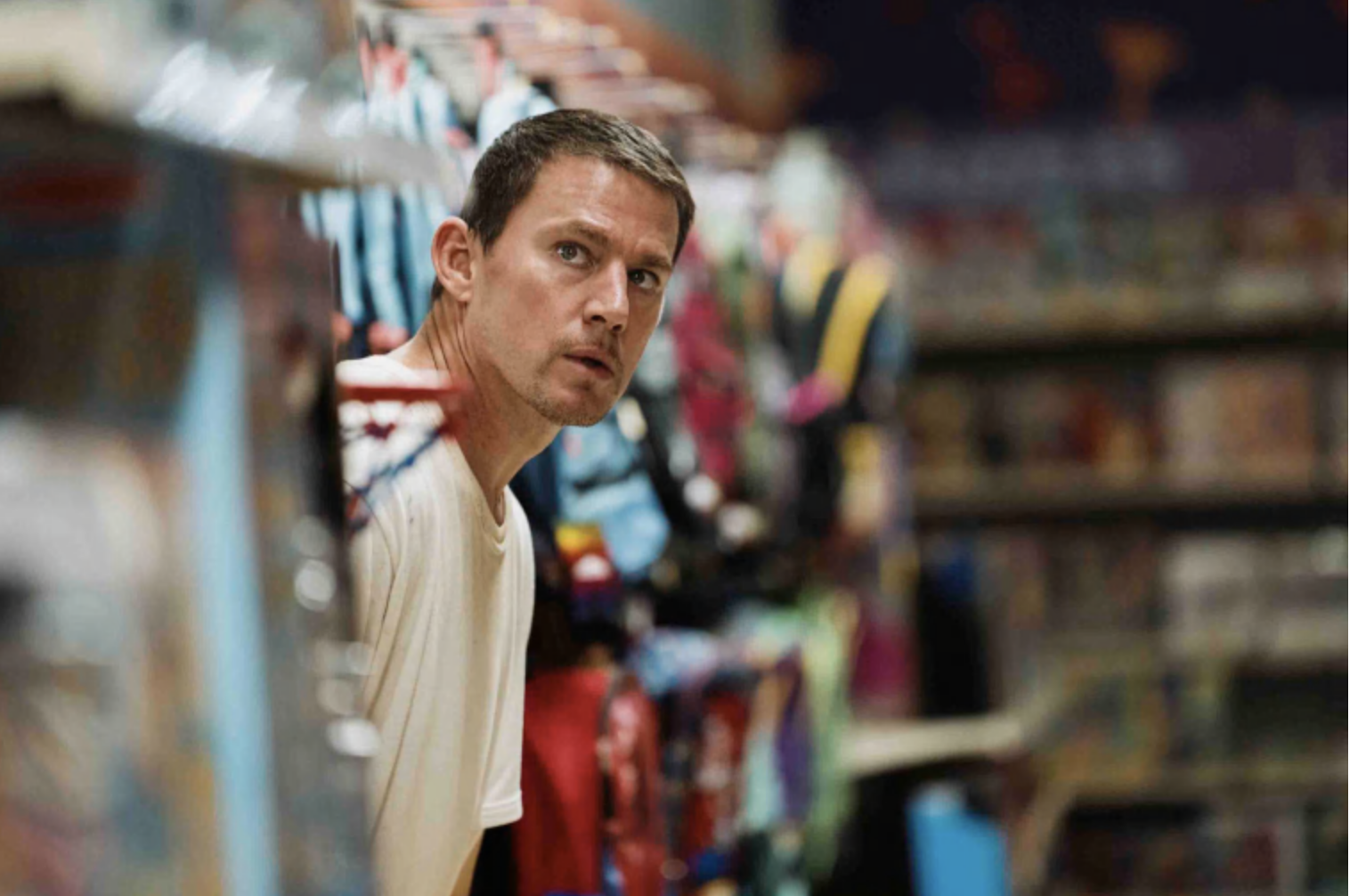ROOFMAN
Directing: B-
Acting: B+
Writing: C+
Cinematography: B+
Editing: C+
Roofman is an old-school, classic case of the trailer being wildly misleading from the actual vibe of the full film. The trailer is cut to make it look like a lot of fun, an entertaining comedy with maybe even a bit of action in it. Really none of that is the case. In fact, Roofman is a surprisingly melancholy film, when all is said and done.
It also can’t seem to decide on any coherent ethical center. The title character, whose name is also Jeffrey, or John when in disguise, is presented as a lovable family man who just can’t seem to get effective criminal behavior down. And, as played by Channing Tatum, Jeffrey is undeniably charismatic—which, we are told, was very much the case with the real-life person and story on which this film is based. Much is made of how “nice” Jeffrey is to the victims he locks into the walk-in freezer when he’s robbing McDonalds by—you guessed it—breaking through the rooftops. But I was out on Jeffrey almost from the very start. I’m supposed to empathize with a sharply observant guy who would easily get a great job if he just got his shit together, but instead decides to commit forty-five counts of armed robbery? Get real.
Furthermore, Jeffrey is recently divorced and has three children: a six-year-old daughter, Becky (Alissa Marie Pearson), and twin infants. The infants are never more than an afterthought, but the opening scenes have Jeffrey desperately trying to connect with Becky. But then, after Jeffrey is convicted, sent to prison, escapes prison, holes up in a local Toys “R” Us, and stupidly hides in plain sight while dating a local church congregant with two daughters of her own, Roofman might as well be suddenly saying: “Becky who?” It’s very odd, how Jeffrey inserts himself into this family, falls for the single mom who also works at the Toys “R” Us, Leigh (Kirsten Dunst) as well as her daughters Lindsey (Lily Collias) and Dee (Kennedy Moyer), all after making one passing reference to the existence of his own children, which he never brings up again.
At least, not onscreen—another odd element to the trailer is how if features scenes not featured in the final cut of the film. There’s a shot in the trailer showing Leigh saying to Jeffrey, “Tell me what’s going on—right now.” Now, to be fair, this is a very common practice and has been for ages; I can still remember the shot of Laura Dern tearing a prehistoric leaf off a plant in the trailer for Jurassic Park, and that shot not being in the film. But usually these changes are harmless. In this case we go in expecting a pointed confrontation between the two leads, and in the end, the way Jeffrey’s inevitable downfall is portrayed as something very passive on the part of Leigh. This is just one of several disappointing elements of the final product of this film.
And it’s too bad, because the story is still relatively engaging, the performances are solid, and Tatum and Dunst have real chemistry. One wonders whether Roofman could have been better than average before essential elements somehow got lost in the edit. There are certainly several other heavy-hitting actors in supporting parts that don’t amount to much, chief of them LeKeith Stanfield as Jeffrey’s army buddy friend, Steve. Stanfield has a proven record of great performances (Judas and the Black Messiah, Uncut Gems, even the opening sequence of Get Out—I could go on), and he’s just not given enough to chew on here. He deserves better than this. But so do Peter Dinklage as Mitch, the Toys “R” Us store manager; Ben Mendelsohn as the church pastor and Uzo Aduba as his wife; even Juno Temple as Steve’s girlfriend. This is a cast far more stellar than the mediocrity of the film would have you expect, which leads one to wonder how different the original script, by Derek Cianfrance (who also directed) and Kirt Gunn, was from the final edit. It’s worth noting that Cianfrance has written excellent scripts in the past, including Blue Valentine (2010), The Place Beyond the Pines (2013), and even a story credit on Sound of Metal (2019).
So what the hell happened with Roofman? Should we just blame the editor, Mikkel E.G. Nielsen? That’s probably unfair; he edited great films too, including both The Banshees of Inisherin (2022) and Sound of Metal. Maybe we should think of Roofman as a mystery movie, just in a very unique way: the mystery is how so many great and talented people got together to make a not-great movie. It’s not like that’s without precedent either, to be fair.
There’s another mark against Roofman, which I’m not sure anyone involved truly thought about: the misguided choice to present a deeply unethical man as a sympathetic hero. Sure, empathy is always a good thing, and that is something I actually feel very strongly about. But there’s a vast difference between empathizing with an unethical person and actively rooting for them in their unethical pursuits. Roofman doesn’t strictly do that, but it’s a bit of hair splitting to say so, when the movie never lands on true clarity regarding the matter. At best, it skirts around it.
Maybe Jeffrey Manchester actually is a fascinating, fun guy. And maybe a much more effective approach would have been to make a documentary about him. The end credits of Roofman features a bunch of archival news footage of people who actually knew him, and victims of actual robberies, talking about how nice he was to them. This is genuinely the most compelling part of the film, which is otherwise moderately entertaining but manages to spend more energy on that than exactly how wrong it is for him to be doing all these things.
Yes, we see you, giving a good performance in a barely-okay movie!
Overall: B-

